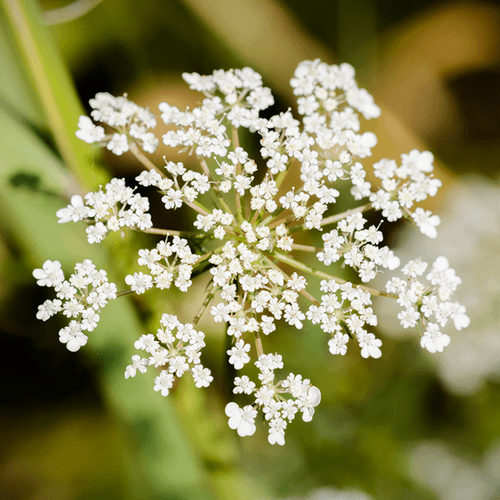
Background
Wild carrot or its seed oil is used for urinary tract problems, digestive problems, to induce menstruation, and for other conditions, but there is no good scientific evidence to support its use for any condition.
In foods, wild carrot oil is used to flavor alcoholic and non-alcoholic beverages, frozen dairy desserts, candy, baked goods, gelatins, puddings, meat and meat products, condiments, relishes, and soups.
In manufacturing, wild carrot seed oil is used as a fragrance in soaps, detergents, creams, lotions, and perfumes.
Safety Safety definitions
There isn't enough reliable information to know if the above-ground parts of wild carrot are safe or what the side effects might be.
Special Precautions & Warnings:
Pregnancy: Wild carrot LIKELY UNSAFE to take by mouth if you are pregnant. The seeds, oil, and parts that grow above the ground can make the uterus contract and might start menstruation. These effects could cause a miscarriage.Breast-feeding: Wild carrot seed oil is POSSIBLY UNSAFE when taken by mouth if you are breast-feeding. The seed oil can act like the hormone estrogen. There isn't enough reliable information to know if wild carrot seeds or the above-ground parts are safe to use when breast-feeding. Stay on the safe side and avoid use.
Allergy to celery and related plants: Wild carrot may cause an allergic reaction in people who are allergic to birch, mugwort, spices, celery, and related plants. This has been called the "celery-carrot-mugwort-spice syndrome."
Kidney problems: Wild carrot might make kidney problems worse, because it irritates the kidneys. Avoid use.
Surgery: Wild carrot might affect blood pressure. Some physicians worry that it might interfere with blood pressure control during and after surgery. Stop using wild carrot at least 2 weeks before a scheduled procedure.
Treatment with UV light: Wild carrot increases the risk of getting a sunburn after exposure to the sun or to UV light. Don't take wild carrot if you are being treated with UV light.
Effectiveness
- Kidney stones and other kidney problems.
- Bladder problems.
- Gout.
- Diarrhea.
- Indigestion.
- Gas.
- Worm infestations.
- Pain in the uterus.
- Heart disease.
- Cancer.
- Water retention.
- Use as a nerve tonic.
- Use as an aphrodisiac.
- Starting menstruation (periods).
- Other conditions.
Dosing & administration
Interactions with pharmaceuticals
Estrogens
Interaction Rating=Moderate Be cautious with this combination.
Large amounts of wild carrot might have some of the same effects as estrogen. But wild carrot isn't as strong as estrogen pills. Taking wild carrot along with estrogen pills might decrease the effects of estrogen pills.
Some estrogen pills include conjugated equine estrogens (Premarin), ethinyl estradiol, estradiol, and others.
Lithium
Interaction Rating=Moderate Be cautious with this combination.
Wild carrot might have an effect like a water pill or "diuretic." Taking wild carrot might decrease how well the body gets rid of lithium. This could increase how much lithium is in the body and result in serious side effects. Talk with your healthcare provider before using this product if you are taking lithium. Your lithium dose might need to be changed.
Medications for high blood pressure (Antihypertensive drugs)
Interaction Rating=Moderate Be cautious with this combination.
Large amounts of wild carrot seem to increase blood pressure. By increasing blood pressure wild carrot might decrease the effectiveness of medications for high blood pressure.
Some medications for high blood pressure include captopril (Capoten), enalapril (Vasotec), losartan (Cozaar), valsartan (Diovan), diltiazem (Cardizem), amlodipine (Norvasc), hydrochlorothiazide (HydroDiuril), furosemide (Lasix), and many others.
Medications that increase sensitivity to sunlight (Photosensitizing drugs)
Interaction Rating=Moderate Be cautious with this combination.
Some medications can increase sensitivity to sunlight. Wild carrot might also increase your sensitivity to sunlight. Taking wild carrot along with medications that increase sensitivity to sunlight could increase the chances of sunburn, blistering, or rashes on areas of skin exposed to sunlight. Be sure to wear sunblock and protective clothing when spending time in the sun.
Some drugs that cause photosensitivity include amitriptyline (Elavil), Ciprofloxacin (Cipro), norfloxacin (Noroxin), lomefloxacin (Maxaquin), ofloxacin (Floxin), levofloxacin (Levaquin), sparfloxacin (Zagam), gatifloxacin (Tequin), moxifloxacin (Avelox), trimethoprim/sulfamethoxazole (Septra), tetracycline, methoxsalen (8-methoxypsoralen, 8-MOP, Oxsoralen), and Trioxsalen (Trisoralen).




